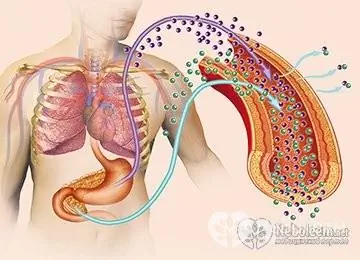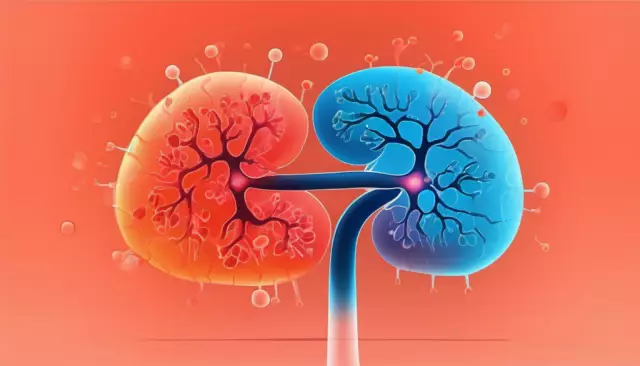- Author Rachel Wainwright wainwright@abchealthonline.com.
- Public 2023-12-15 07:39.
- Last modified 2025-11-02 20:14.
Zollinger-Ellison syndrome

Zollinger-Ellison syndrome is a symptom complex characterized by the appearance of peptic ulcers of the stomach and duodenum, accompanied by regular diarrhea. This ailment was named in honor of doctors who, in 1955, discovered a relationship between pancreatic secretions, high acid production of gastric juice and the formation of peptic ulcers. In contrast to the classical clinical picture, antiulcer therapy is ineffective in Zollinger-Ellison syndrome. Next, we will look at what causes the disease, and what treatment it requires.
Gastrinoma - Zollinger-Ellison syndrome
The currently known factor causing the Zollinger-Ellison syndrome is a gastrin-producing tumor (gastrinoma), which is characterized by a clinical triad: hypersecretion of hydrochloric acid, recurrent peptic ulcers, pancreatic tumor (it was precisely this that was described in their writings by the American doctors R. Zollinger and E. Allison).
The tumor that causes the symptoms of Zollinger-Ellison syndrome is localized in 15% of cases in the stomach, in the rest of the recorded examples - in the head or tail of the pancreas. In this regard, the production of gastric juice, hydrochloric acid and enzymes increases, which together leads to the development of peptic ulcers that cannot be treated. Most patients have duodenal ulcers, but often in the stomach and jejunum, and, as a rule, pathological formations are multiple in nature.
Symptoms of Zollinger-Ellison Syndrome
Outwardly, the symptoms of Zollinger-Ellison syndrome resemble a common peptic ulcer, that is, there is severe pain in the epigastrium on palpation, local pain in the area of ulcers, but unlike peptic ulcer of the duodenum or stomach, this ailment does not respond to conventional treatment.
The main signs of Zollinger-Ellison syndrome include pain in the upper abdomen. If ulcers are localized in the stomach, then the discomfort increases half an hour after eating, if in the duodenum, then it becomes more noticeable on an empty stomach, and after eating it subsides. As mentioned above, even long-term symptomatic treatment of Zollinger-Ellison syndrome (antiulcer therapy) has no effect. In this case, inflammation of the mucous membrane of the esophagus can be observed, as a result of which its lumen narrows.
In addition, persistent heartburn and sour belching are a characteristic symptom of Zollinger-Ellison syndrome. Excess hydrochloric acid enters the small intestine, increasing motility and slowing down absorption, as a result of which the stool becomes abundant, watery with a large amount of fat, and the patient quickly loses weight in a short time.
With a malignant course of the disease, tumor formations can appear in the liver, which makes this organ noticeably increase in size.
Diagnosis of the syndrome
Since outwardly the symptoms of Zollinger-Ellison syndrome are very similar to a peptic ulcer, the task of differential diagnosis is to confirm or exclude the presence of a tumor. X-rays and endoscopy will reveal the presence of ulcers, but not the underlying tumor. The Zollinger-Ellison syndrome is indicated by an increased level of gastrin in the blood (up to 1000 pg / ml versus 100 pg / ml in peptic ulcer disease). Another distinguishing feature is the acidity of the main secretion of more than 100 mmol / h. When diagnosing, you should be wary if the ulcerative lesion is multiple in nature, or if the ulcers are located rather unusual.
In the presence of these signs, it is possible to prescribe a study by ultrasound, computed tomography and, especially, selective abdominal angiography, which will allow visualizing the tumor.
Treatment for Zollinger-Ellison syndrome

Gastrinoma in Zollinger-Ellison syndrome is a potentially malignant formation, and radical or conservative treatment can be prescribed to eliminate it. In the first case, a complete excision of the gastrinoma is performed with further examination of the internal organs for metastases. As a rule, by the time of the operation they are already quite common, and only 30% of the operation leads to a complete cure. Since ulcers recur quickly, gastric resection is ineffective. Conservative treatments for Zollinger-Ellison syndrome include drugs that inhibit the production of hydrochloric acid, which are taken in high doses in view of the likely recurrence of ulcers and are usually prescribed for life.
If a malignant inoperable gastrinoma is diagnosed with Zollinger-Ellison syndrome, chemotherapy is prescribed. But since the tumor grows rather slowly, the prognosis is better than with other malignant tumors. In this case, the lethal outcome is not due to the tumor itself, but due to the complications of extensive ulcers.
YouTube video related to the article:
The information is generalized and provided for informational purposes only. At the first sign of illness, see your doctor. Self-medication is hazardous to health!






